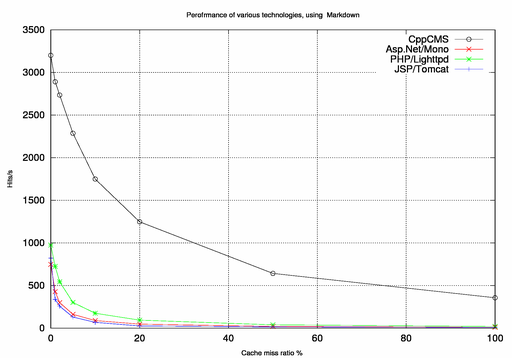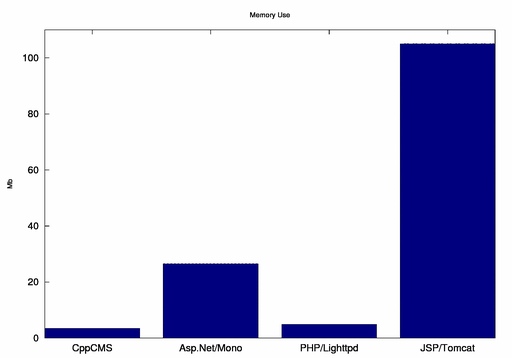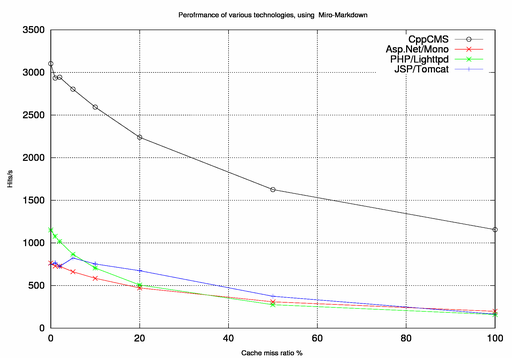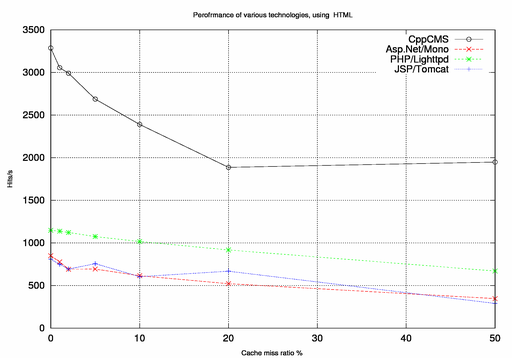Posts in category ‘Benchmarks’.
Serving All Israeli News Web Sites from a Single EC2 instance...
For the last year the development of the CppCMS project was less active. The vast majority of the work hours were spent on a customer's project that used CppCMS to create an outstanding advertisement system.
The project is called Linicom.
Today, when Linicom is up, running and maintained by a larger team, so I can resume the activity on the core CppCMS project itself.
Few words about Linicom:
Linicom is an engine that provides content and visitor sensitive advertisements for almost all large Israeli news web sites: including Ynet, Haaretz, Jerusalem Post, Mako, Walla and other significant web sites in Israel and abroad.
Here some interesting facts:
- Linicom is based on CppCMS technology.
- The system serves around 10,000,000 custom requests a day, i.e ~115 req./s.
- During peak hours, it servers around 160 requests per second.
- Its typical network output is around 11 megabit per second.
- Its total memory consumption (web server, database, applications, OS) is only around 350Mb.
- The server's average CPU load is around 5%
- The server runs on a
c1.mediumAmazon EC2 instance.
The system runs behind Lighttpd and uses PostgreSQL for persistent data storage. Also PostgreSQL is used extensively, all real time data is stored in memory.
Almost every request needs data processing in order to provide highly customized advertisements. In technical terms it means that almost no request can be "outsourced" to a static files - every request for every customer should be processed explicitly.
This system is probably one of the classic applications of CppCMS technology - web based system that required to be fast and efficient, being able to handle outstanding and sometimes unexpectedly changing loads without problems and provide high QoS.
Use of in-memory data storage, caching and efficient handing of the data that can't be cached is were CppCMS shines. Having a big growth potential with a minimal required maintenance and high reliability allows the to handle the business-end safely without worrying about performance issues.
When the memory allocation matters
There are many different bottle necks in C++ networking applications, many of them related to the architecture, the way system calls are used, the way application generates the data.
However at certain point applications reach the point when memory allocation becomes the bottle neck, this is especially relevant for the cases where text strings are widely used. And this is usually the case for all networking and web applications that finally need to deal with strings.
The old and good std::string has one limitation - it requires memory allocation
for the chunk it represents. This is actually correct for almost any kind of string around whether they reference counted, immutable - all they allocate chunks
of memory.
Consider situation, where I need to search against path /foo/bar/123 in
some hierarchical structure like std::map that uses std::string as the key.
So I need to find a path using after fetching two keys foo and bar from
the path.
So basically for the function:
void find_path(std::string const &str);
The call:
find_path("/foo/bar/123");
Would need to:
- Create a string
/foo/bar/123 - Create a sub-string
foo - Create a sub-string
bar
So I've got three memory allocations and this is not matter whether these strings are mutable or immutable, reference counted or not.
CppCMS should handle such code in multiple places so how it solves this problem?
Create a special object
cppcms::string_keyit holds inside a fullstd::stringbut also can be created explicitly from a pair of twochar const *pointers that define a text in range[begin,end).What is important that in in the second case object does not copy the data but only references it and I'm as a user responsible to ensure that the text range remains valid as long as I use this object.
Now we add an overload for the function above:
void find_path(char const *str); void find_path(std::string const &str);And when we split the text into parts we use only "unowned-strings" such that creation of a strings
/foo/bar/123,foo,barwould not require memory allocation at all.
It is a general line, but there are much more interesting tricks to deal with 0 or few allocation strings and streams, like creation of a small memory pools that release all strings in once, like using on stack storage for small text chunks and much more.
This technique is widely deployed in CppCMS 0.99.9 code and had allowed to improve performance of page generation by up to twice in some cases.
Now these tricks should be done careful as they rely on manual memory
management so, unless you do something many-many times or you detect
some bottle-neck in the application still stick with std::string as
it is usually good enough. Memory allocation today is very fast, just
don't abuse it.
Version 0.99.9 Released
New Features:
Clang is support provided, CppCMS was tested against Clang 2.8.
Now CppCMS supports 5 families of C++ compilers:
- GCC 3.4.x to 4.6.1
- Visual Studio 2005 - 2010
- Clang 2.8
- Intel 11
- Sun Studio 5.10
Significant performance improvements in XSS filtering by rewriting URI validation using a C++ parser rather then using complex regular expression.
Added support of fully custom validation for HTML attributes using callback functions in the XSS filter.
Significant performance improvements over multiple places in code by eliminating multiple memory allocations:
- HTTP, SCGI and FastCGI backends - improved memory allocation for CGI variables.
- Fetching values from JSON objects using get(...), find(...) APIs is now done with 0 memory allocation.
- URL mapping is now done with 0 or very low memory allocation.
- Various filters like
escape,urlencodeand some others now work with no or few memory allocations.
Performance improvements in caching by replacing the balanced binary tree by hash table in the primary cache key index.
Breaking Changes:
json::objecthad changed fromstd::map<std::string,value>tostd::map<string_key,value>. It should be fully transparent for almost all users.
Bugs:
- Fixed a crash in http::response when writing HTTP headers throws due for example to incorrect file permissions.
- Fixed a bug in
booster::regexthat prevented some valid patterns to be matched against some regular expressions. - Fixed a bug that may prevent from
booster::regexto work on big endian 64 bit platforms - Added initial support of Python3 for templates compiler.
- Added a workaround for systems that use python3 by default.
CppCMS benchmarks vs Java, C#, PHP
Long time ago I had posted a benchmarks comparing CppCMS based blog and PHP based one.
I wanted to compare real life applications with each other. For a long time I had been searching for similar applications in several technologies doing very similar jobs in leading technologies: PHP, Asp.Net and Java/JSP. The last two were particularly important as they use static type system and "compiled" languages as C# and Java that are known to be faster then other dynamic typed languages like PHP, Python, Ruby and Perl popular in web development.
Setup
Unfortunately I had failed to find such application, so finally I decided to write something representative and small on my own an application with following requirements:
- Uses simple time-out based page caching
- Uses MySQL and the database and keeps open connections in pool.
- For each request access to database (if page is not cached), fetches the page content and comments for "sample article" in blog.
- Converts text to HTML using a markdown filter and displays it on page.
I used following technologies:
CppCMS:
Version: 0.99.3
MySQL Connection: dbixx/libdbi library using libmysqlclient
Markdown library: discount
Connection: internal HTTP serverPHP
Version: 5.2.6
MySQL Connection: internal driver
Markdown library: PHP-Makrdown
Connection: Lighttpd 1.4.19 + FastCGI
Bytecode Cache: XCacheAsp.Net/Mono
Version: 2.6.7
MySQL Connection: Connector/Net
Markdown library: MarkdownSharp
Connection: internal HTTP server XSP (found to be much faster than fastcgi server)JSP/Tomcat
Version - Tomcat: 6.0.18
Version - Java: Sun Java 1.6.0_12
MySQL Connection: Connector/J
Markdown library: jmd-0.8.1
Caching: oscache 2.4.1
Connection: HTTP
I tested following parameters:
- Pages per seconds generation for different cache hit/miss ratio: stating from 0% miss ratio up to 100% miss ratio.
- Memory usage
For each test the application was "warmed up" with 100 requests to fill the cache, and then 1000 request with max concurrency of 5 request are done, while certain percent of them is new pages and the other are taken from "warmed up" once.
Notes:
I used the fastest Markdown implementation I had found.
C# implementation is the same one that http://stackoverflow.com uses - it is actually heavily optimized implementation based on older C# implementation
The Java implementation is based on the above C# and the fastest one I had found.
Discount is the fastest C implementation of markdown that I had found.
Results:


Summary
- C#, Java and PHP implementation behave very similarly and without significant differences.
- The memory usage of Java/Tomcat and Mono/Asp.Net was significantly higher - up one or two orders of magnitude in comparison to CppCMS and PHP
- Surprisingly PHP behaves very well, in comparison to "compiled" languages like Java and C#.
Revisiting
After doing some profiling it was clear that C implementation of Markdown was significantly faster then all other implementations. So I decided to create my own mini-markdown that make some basic handing of titles, lists, paragraphs and quotes at one level only. That is very simple syntax but implemented similarly in all 4 languages using same algorithm.
The results were following:

The difference between CppCMS and other implementations was still significant but still much smaller then the difference between real markdown implementation. So the performance difference was less dramatic.
2nd Revision
And in the last revision I decided not to use any text filters by fetch ready HTML formatted content from DB and display it on the web as is.
Such comparison actually profile the most basic stuff:
- Caching
- SQL Connection
- Request/Response handling
And would ignore hundreds lines of code used in any web applications responsible for the actual business logic.

Conclusions
- Using C++ with CppCMS provides significant performance gains in developing web applications even in very basic case.
- The performance is effected not only by the framework itself but also by many other libraries that are in use. Using highly optimized C and C++ libraries may give significant performance gain in many cases.
- Such called "jit-compiled" languages as C# and Java and the frameworks based on the use significant amount of memory and still provide much lower performance then the one that can be achieved using real compiled languages like C++.
- It is good to remember that these benchmarks are still quite synthetic ones and in real life the actual performance depend on many factors - but using high quality and high performance libraries available for C++ have significant impact on performance.
Results Data
Markdown
---------
Miss % CppCMS Mono PHP JSP/Tomcat
0 3200.73 747.164 974.142 821.887
1 2891.2 427.727 724.173 337.736
2 2734.69 300.017 544.162 257.44
5 2285.95 162.686 301.507 130.023
10 1749.14 89.4447 174.724 68.5387
20 1247.86 47.7347 93.7919 25.7081
50 642.769 19.8311 38.979 15.1298
100 356.968 9.77116 20.1892 7.96328
Mini-Markdown
---------
Miss % CppCMS Mono PHP JSP/Tomcat
0 3103.14 763.222 1152.63 744.72
1 2933.97 728.971 1076.38 765.599
2 2944.42 726.338 1016.42 724.869
5 2804.44 661.613 866.32 822.927
10 2592.99 584.725 705.465 753.218
20 2239.03 471.576 507.021 674.488
50 1625.5 309.443 274.962 374.26
100 1156.09 197.123 159.974 164.515
HTML
-----
Miss % CppCMS Mono PHP JSP/Tomcat
0 3286.51 849.849 1147.21 808.038
1 3055.53 776.305 1137.35 748.829
2 2991.02 691.502 1122.88 693.439
5 2687.84 693.257 1074.22 756.618
10 2390.12 615.311 1016.27 604.452
20 1886.69 521.467 917.225 668.23
50 1947.93 346.672 669.693 289.656
System and Hardware
- OS: Linux, Debian Lenny, 64 bit
- Hardware: AMD Athlon XP 3000, 64 bit, 1GB memory
Related:
Code
The Code can be downloaded from there. note, to run it you will need to have some libraries installed and configure some hardcoded paths to make it run.
more...Asp.Mono in Linux? Not Yet...
During development of CppCMS I have always wanted to do some benchmarks against one of the most popular web development technologies: Asp.Net. I had found a blogging system: BlogEngine.Net that in its latest version had full support of mono under Linux, support of MySQL --- all I need to run benchmarks against CppCMS.
The beginning was promising. The instructions were simple, there was an actual blog running BE.Net under Apache mod_mono on Ubuntu. There were Linux specific instructions as well.
So, first of all I had installed mono 1.9.1 from Etch backports. The first problem I had to deal with was an installation problem --- the version of C# compiler and mono environment were different. This was solved quite simply. So, I could finally see BE.Net running under Mono using XML as data storage backend.
Then, I wanted to add MySQL storage backend. The problems had come very soon. The MySQL database script was written under assumption that table names are case insensitive. That was not true for MySQL under Linux. This problem was fixed.
more...
